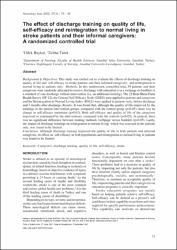| dc.contributor.author | Baykal, Dilek | |
| dc.contributor.author | Tulek, Zeliha | |
| dc.date.accessioned | 2023-12-06T07:00:03Z | |
| dc.date.available | 2023-12-06T07:00:03Z | |
| dc.date.issued | 2022 | en_US |
| dc.identifier.citation | Baykal, D., & Tulek, Z., (2022). The effect of discharge training on quality of life, self-efficacy and reintegration to normal living in stroke patients and their informal caregivers: A randomized controlled trial. NEUROLOGY ASIA , vol.27, no.1, 73-83. | en_US |
| dc.identifier.uri | https://hdl.handle.net/20.500.12900/219 | |
| dc.description.abstract | Background & Objectives: This study was carried out to evaluate the effects of discharge training on quality of life and self-efficacy in stroke patients and their informal caregivers; and reintegration to normal living in patients only. Methods: In this randomized, controlled trial, 59 patients and their caregivers were randomly allocated to receive discharge with education (via a webpage or booklet) or a standard of care discharge without intervention (i.e. an additional training). The 12-Item Short-Form Health Survey (SF-12), the General Self-Efficacy Scale (GSES) were applied to patients and caregivers and the Reintegration to Normal Living Index (RNLI) were applied to patients only, before discharge and 3 months after discharge. Results: It was found that, although the quality of life improved by the trainings in the patient intervention groups, compared with the control group (p<0.05); there was no change in self-efficacy parameter (p>0.05). Both self-efficacy and quality of life of the caregivers improved or maintained by the interventions, compared with the controls (p<0.05). In general, there was no significant difference between training methods (webpage versus booklet) (p>0.05). Lastly, the impact of discharge trainings on reintegration to normal living which was assessed in the patients only, was found to be limited. Conclusion: Although discharge training improved the quality of life in both patients and informal caregivers, its effect on self-efficacy in both populations and reintegration to normal living in patients was found to be limited. | en_US |
| dc.language.iso | eng | en_US |
| dc.publisher | ASEAN NEUROLOGICAL ASSOC | en_US |
| dc.relation.isversionof | 10.54029/2022wwm | en_US |
| dc.rights | info:eu-repo/semantics/openAccess | en_US |
| dc.subject | Bakıcılar | en_US |
| dc.subject | Caregivers | en_US |
| dc.subject | Taburculuk eğitimi | en_US |
| dc.subject | discharge training | en_US |
| dc.subject | Yaşam kalitesi | en_US |
| dc.subject | Quality of life | en_US |
| dc.subject | Öz yeterlik | en_US |
| dc.subject | Self- efficacy | en_US |
| dc.subject | Felç | en_US |
| dc.subject | Stroke | en_US |
| dc.subject | Sağlık Profesyonelleri | en_US |
| dc.subject | Health-Care Professıonals | en_US |
| dc.subject | Aile Bakıcı | en_US |
| dc.subject | Famıly Caregıver | en_US |
| dc.subject | Hayatta Kalanlar | en_US |
| dc.subject | Survıvors | en_US |
| dc.subject | Müdahaleler | en_US |
| dc.subject | Interventıons | en_US |
| dc.subject | Kurallar | en_US |
| dc.subject | Guıdelınes | en_US |
| dc.subject | Eğitim | en_US |
| dc.subject | Educatıon | en_US |
| dc.subject | Yük | en_US |
| dc.subject | Burden | en_US |
| dc.subject | Güncelleme | en_US |
| dc.subject | Update | en_US |
| dc.title | The effect of discharge training on quality of life, self-efficacy and reintegration to normal living in stroke patients and their informal caregivers: A randomized controlled trial | en_US |
| dc.type | article | en_US |
| dc.department | İstanbul Atlas Üniversitesi, Sağlık Bilimleri Fakültesi, Hemşirelik Bölümü | en_US |
| dc.authorid | 0000-0001-5965-9318 | en_US |
| dc.contributor.institutionauthor | Baykal, Dilek | |
| dc.identifier.volume | 27 | en_US |
| dc.identifier.issue | 1 | en_US |
| dc.identifier.startpage | 73 | en_US |
| dc.identifier.endpage | 82 | en_US |
| dc.relation.journal | Neurology Asia | en_US |
| dc.relation.publicationcategory | Makale - Uluslararası Hakemli Dergi - Kurum Öğretim Elemanı | en_US |

















